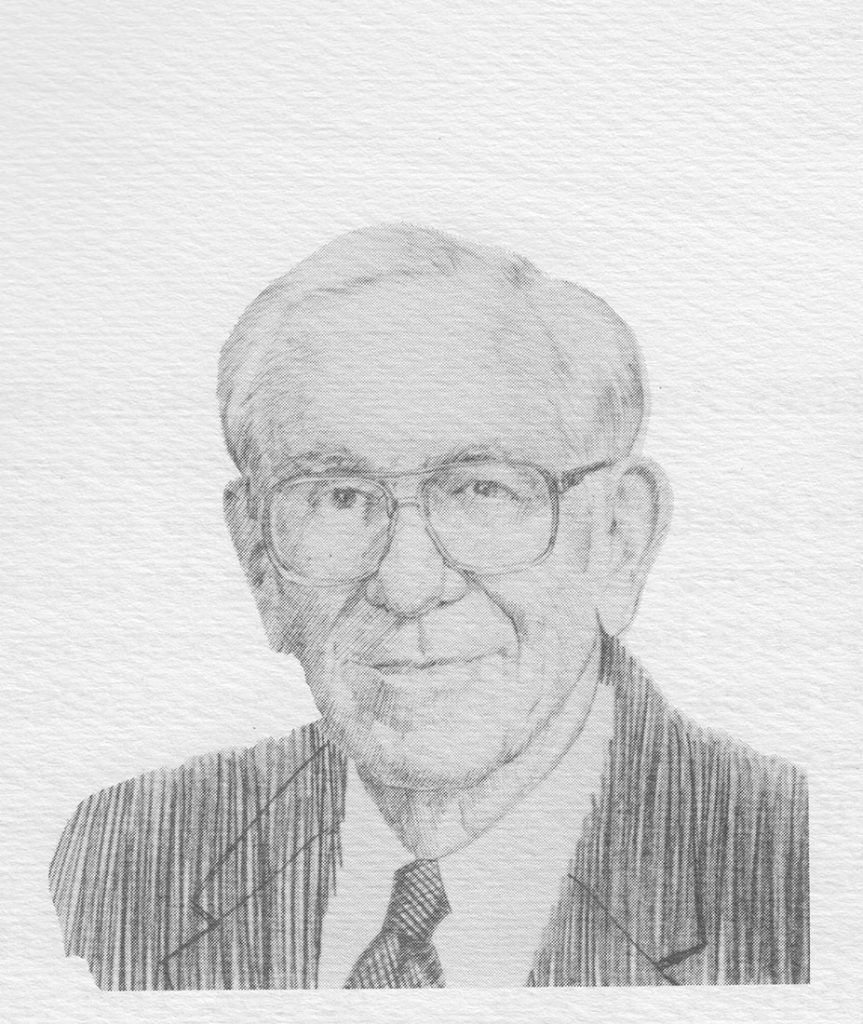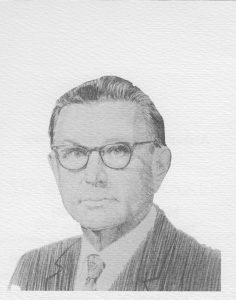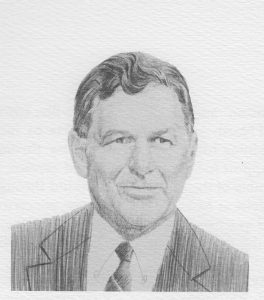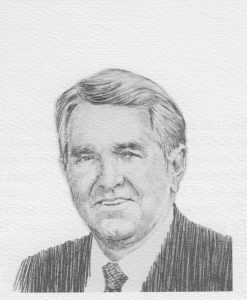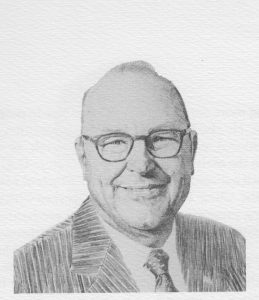Bill Mitchell’s roots run deep in Florence, Alabama, but his influence has branched out over the entire state.
William H. Mitchell was born on February 1, 1921, to William H. Mitchell and Celestine Martin Mitchell. His great-grandfather was a Scotch-Irish immigrant who pastored the Presbyterian church in Florence from 1843 to 1850; his grandfather served as probate judge, a 19th-century legislator, and still later as the state tax commissioner; and his father practiced law in the city. But while his heritage is proud, Bill Mitchell’s own efforts are what have written a place for him in Alabama history.
As a youth Mr. Mitchell attended Florence City Schools, going on to matriculate at Davidson College. After completing his undergraduate liberal arts education, he joined the United States Army, serving his country in the North African and European theaters of operation during World War II and earning a non-combat Bronze Star with Oak Leaf Cluster and a Legion of Merit award. Returning to his home state, he completed his degree in the law at The University of Alabama, receiving it along with membership in the Farrah Order of Jurisprudence. His formal education complete, he returned to Florence to practice law from 1946 to 1958, with bride Ellie Richardson by his side.
It was then he began his active career in banking, as president and chief executive officer of the First National Bank of Florence. (He had served as an inactive vice president of the concern, now SunTrust Bank, Alabama, N.A., from 1954-1958.) Over the years the bank’s assets grew from $23 million to more than $276 million at the time of Mr. Mitchell’s retirement in 1985, making it at that time the largest independent bank in North Alabama. He is modest about the role he played in the bank’s good fortunes.
“Any success we’ve had can be attributed to the general growth of the area, the good management that began well before I joined the bank, and to the confidence the public has in the bank,” he commented in a May 1978 interview with Alabama News Magazine upon his election as president of the Alabama Bankers Association. “We advertise that we’ve got deep roots in the community, and we try to be involved in all parts of community life.”
For Bill Mitchell, that involvement meant serving on the Eliza Coffee Memorial Hospital Board of Governors, as chairman of the Muscle Shoals Regional Library Board, president of both the Florence Junior Chamber of Commerce and the Florence Chamber of Commerce, president of the Florence Rotary Club, chairman of the Lauderdale County chapter of the American Red Cross, vice president of the Lauderdale County United Fund, and as a member of the Board of Directors of the Alabama State Chamber of Commerce and the Alabama Department of Archives and History Board of Trustees. At First Presbyterian Church in Florence, he has served as a ruling elder, trustee, Sunday School teacher, and superintendent.
He also backed up his belief in education with his volunteer efforts as a member of The University of Alabama System Board of Trustees, a charter member of The University of Alabama College of Commerce and Business Administration Board of Visitors, vice president of The University of Alabama National Alumni Association and as a member of the University of North Alabama President’s Cabinet. Combining his strong religious beliefs with his support for education, he also served as a member of the Board of Directors for Southwestern at Memphis (now Rhodes College), and as a member of the Board of Trustees for the Presbyterian Home for Children.
Bill Mitchell’s community recognized his business, volunteer, and philanthropic efforts, showing its pride by awarding him the first-ever Chamber of Commerce of the Shoals Lifetime Achievement Award. In comments at the awards ceremony in 1988, then WOWL-TV Board Chairman Dick Biddle said, “From his former position as president of the First National Bank of Florence, Bill has been constantly in the forefront of matters pertaining to the economic well-being of the Shoals. He is privately credited with being the one that brought together the board of directors of TV A and Reynolds Metals Company, resulting in a compromise that allowed Reynolds to continue to operate in the Shoals.
“Bill has been a very private man. Many of his deeds have gone unnoticed. He is dedicated to his family, his profession, and his community. And Bill carries on the tradition of an illustrious family of Shoals Mitchells.”
Others also recognized Bill Mitchell over the years. He was named the Florence Rotary Club Paul Harris Fellow, enrolled in the Florence Exchange Club Book of Golden Deeds, named Citizen of the Year by the Florence Civitan Club, and received a Brotherhood Award from the National Conference of Christians and Jews in 1983. That award was presented by Dr. John C. Wright of the University of Alabama in Huntsville, who noted about Mr. Mitchell, “his acts to facilitate the building of the economy through his banking career and related service, concern for the welfare of mankind through community and broader service, concern for religious convictions … concern for the intellect.”
When Mr. Mitchell looks back over that banking career, he is able to say the biggest change he experienced during his tenure as First National’s president and as an active member and leader of the Alabama Bankers Association was when the nation’s banking industry was deregulated in the late 1970s. “Banking was a protected industry when I started out,” he remembers. “Everybody in our market paid the same for deposits and charged the same for loans … if one word characterizes the whole industry, that word would be ‘change.’ ”
And Bill Mitchell has seen change in his beloved Florence, as well. During his life, the counties of Lauderdale and Colbert merged their chambers of commerce to foster economic expansion, meaning closer ties between the cities of Sheffield, Muscle Shoals, Tuscumbia, and Florence. But that did not change Mr. Mitchell’s approach to doing business, which centered over the years around the ability to develop lifelong relationships. “I have never met a person who I did not learn something from and who did not mean something special to me,” he says. And it is those relationships that drove his desire to help his city and his state. “I basically just like people and feel that if an individual is going to spend time in a community he should help that community,” he says.
“A lot of people have helped this area out, and I am just one of them.”

